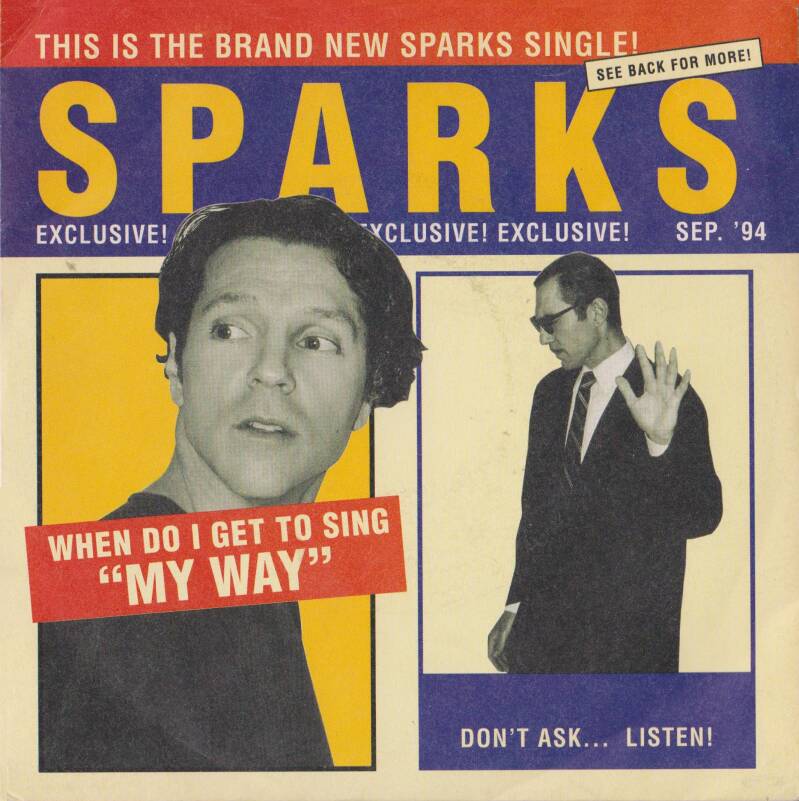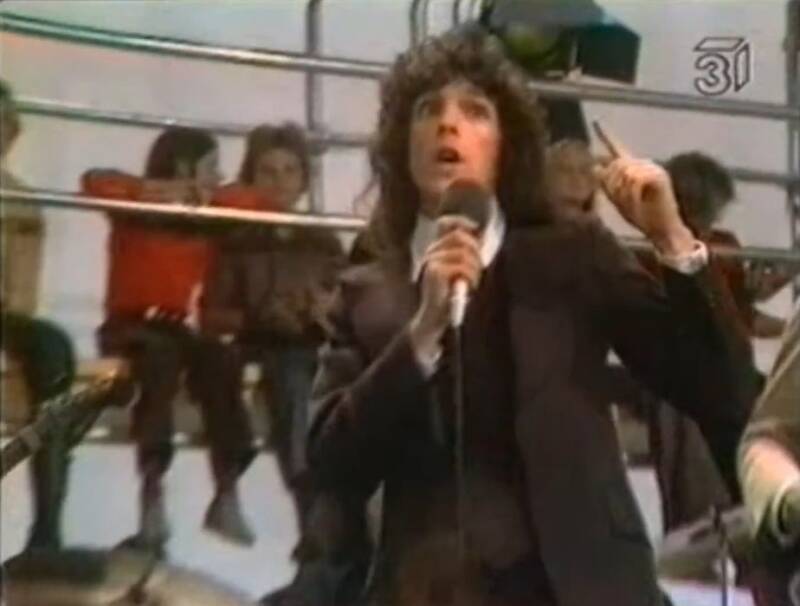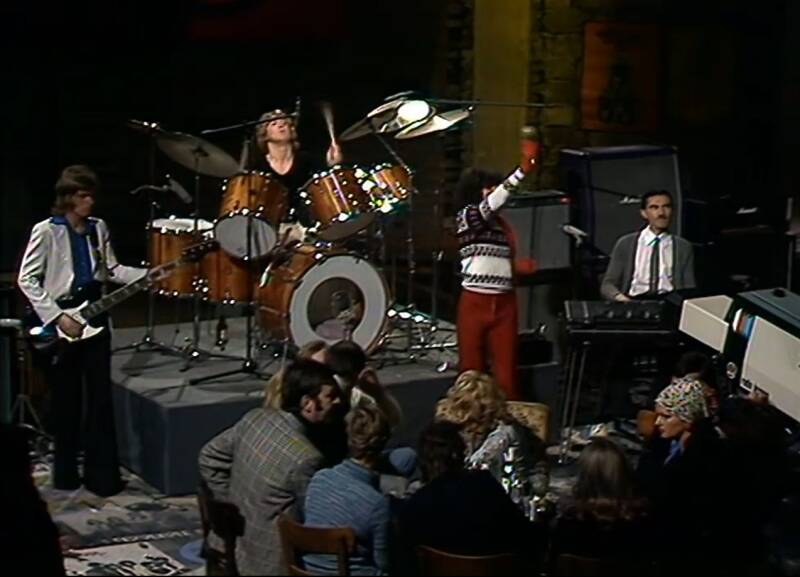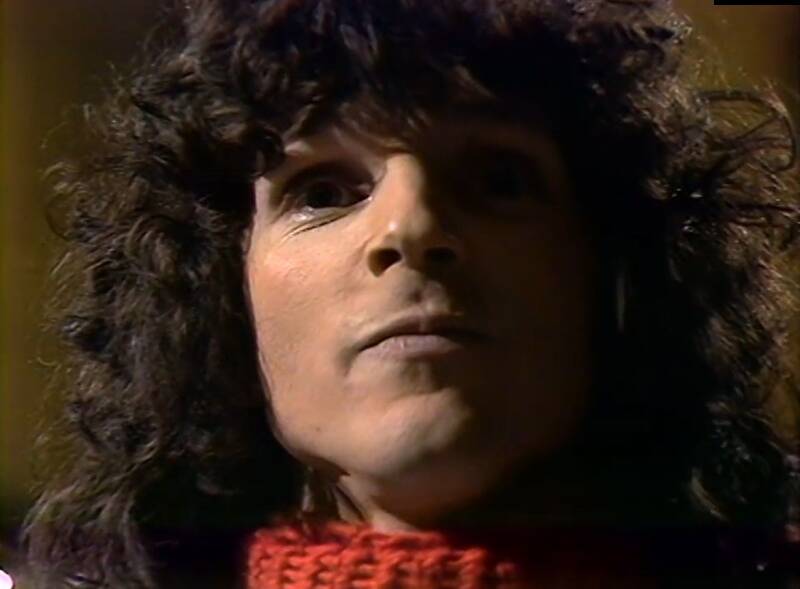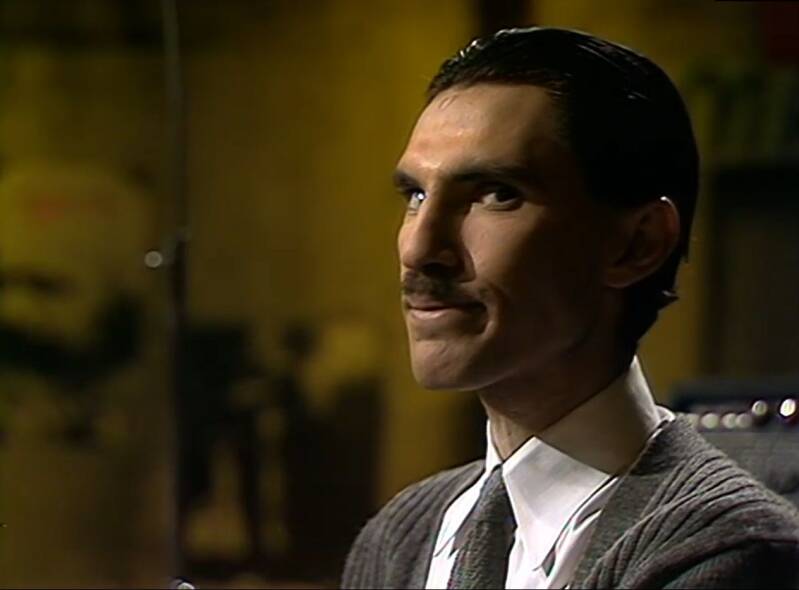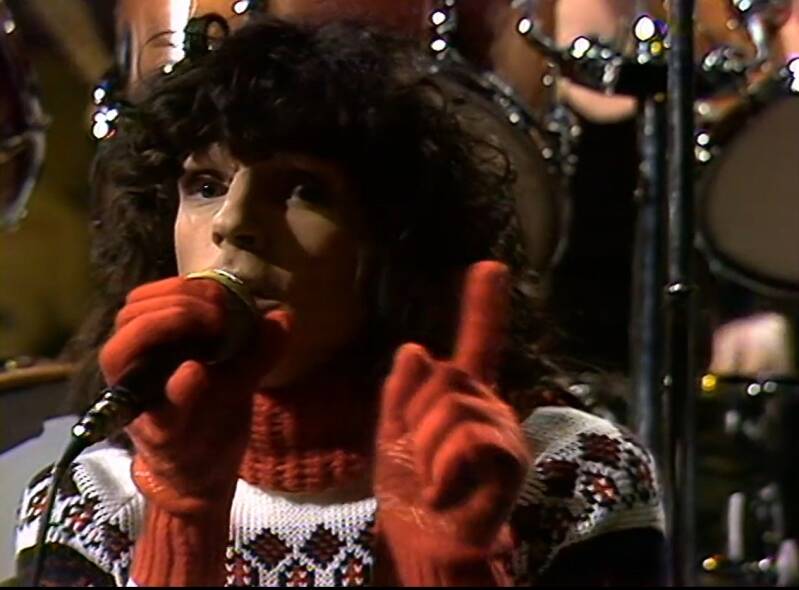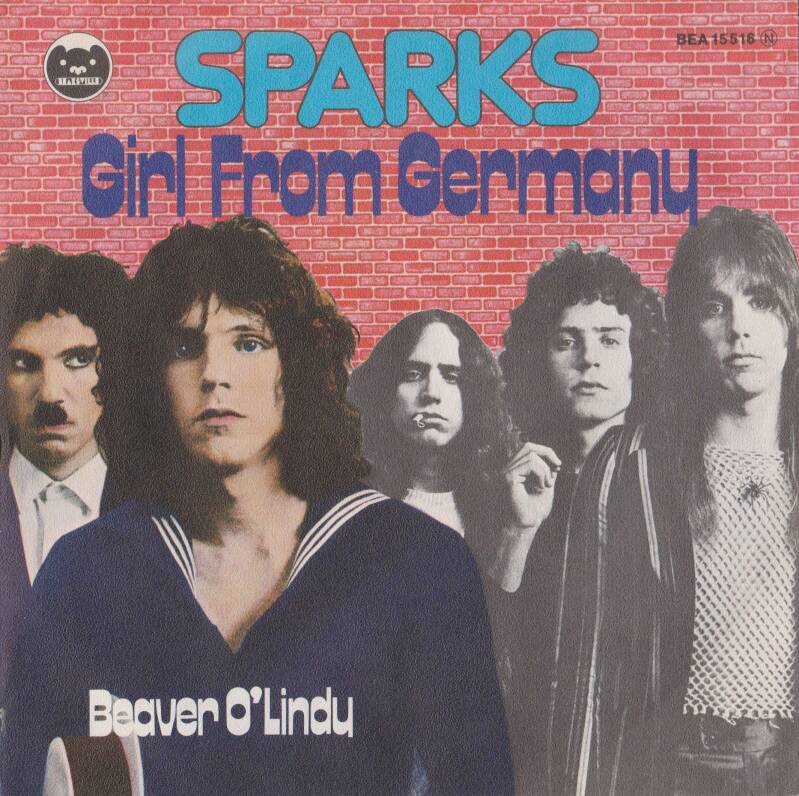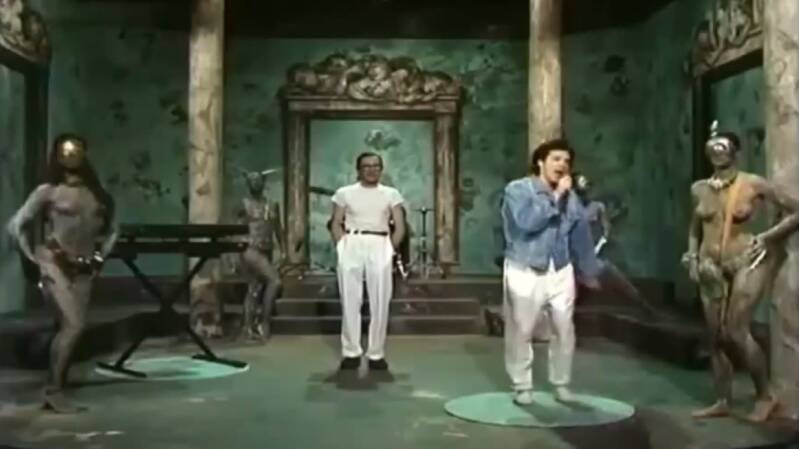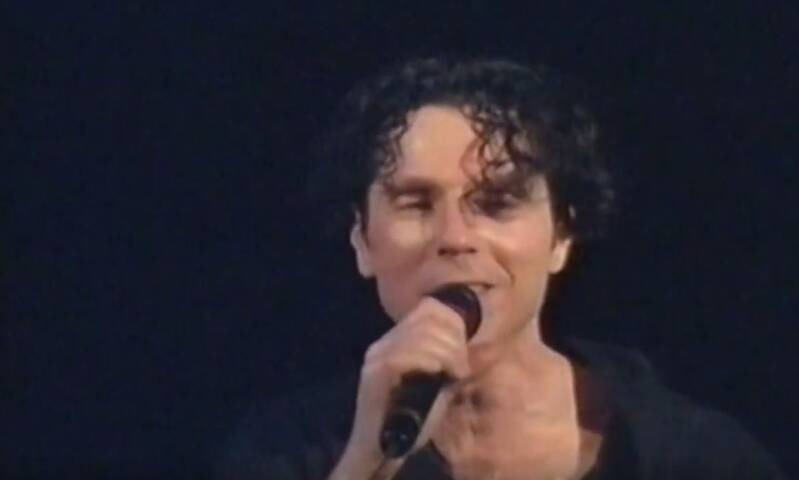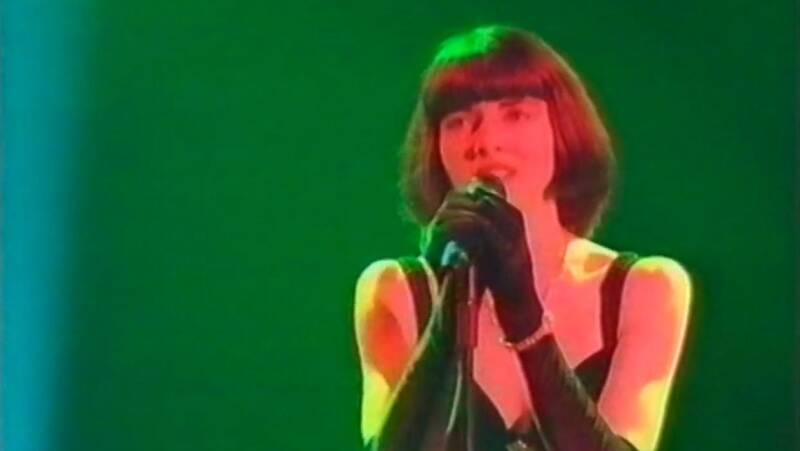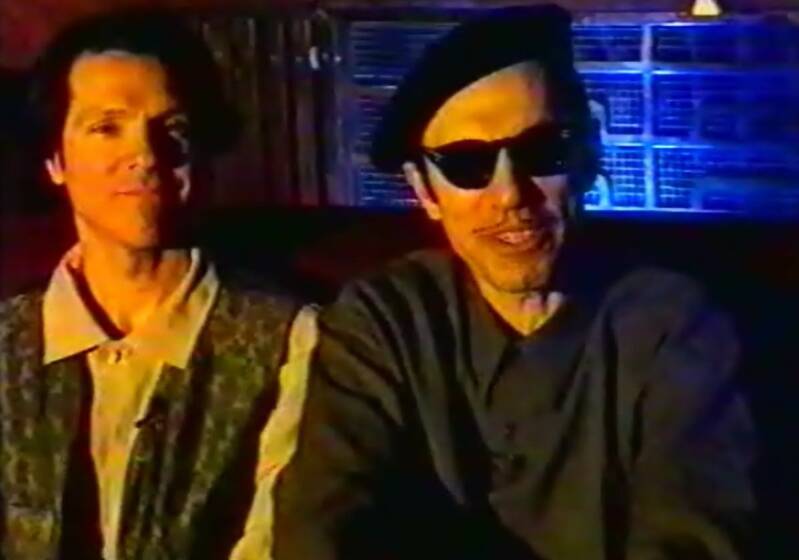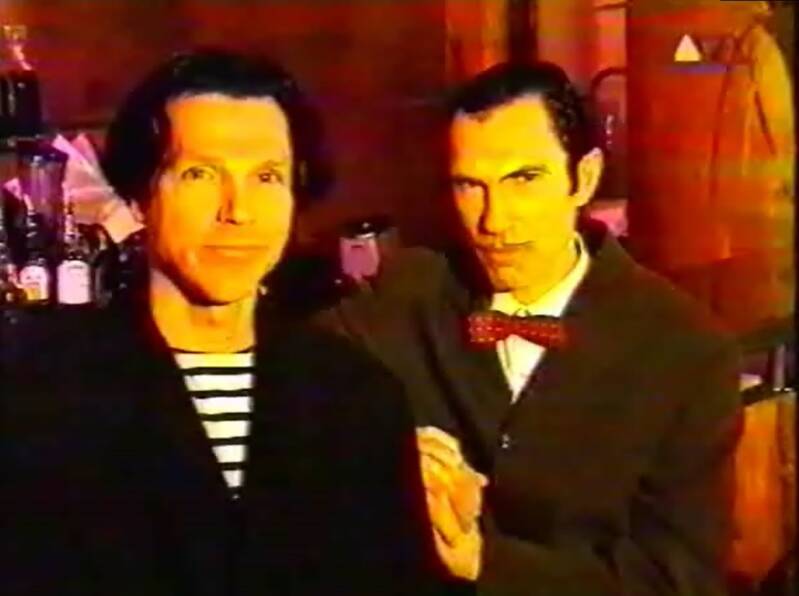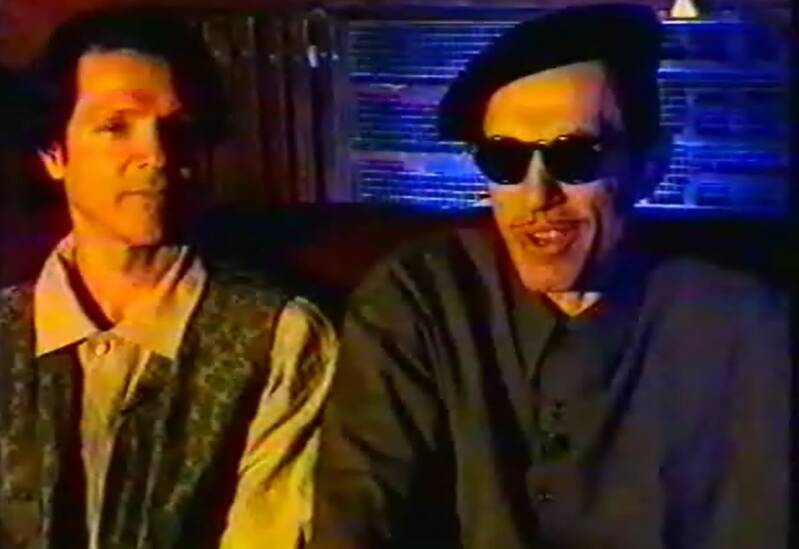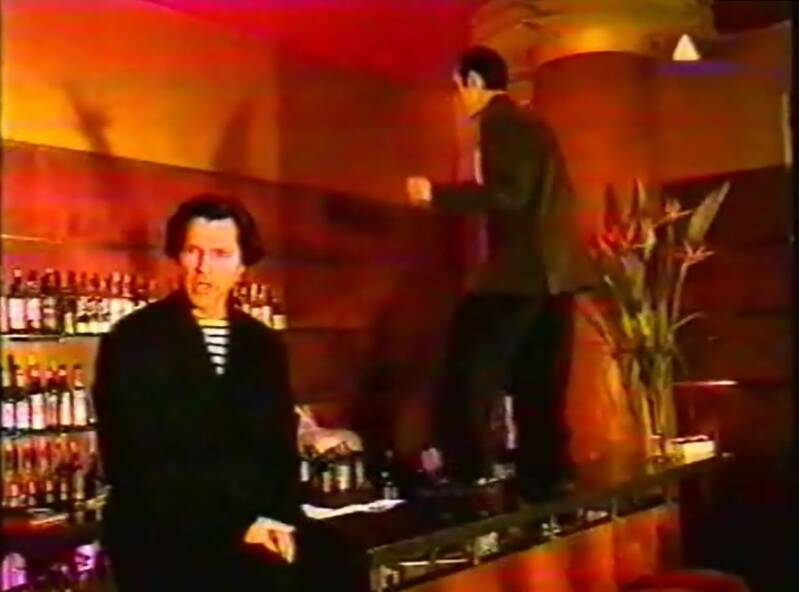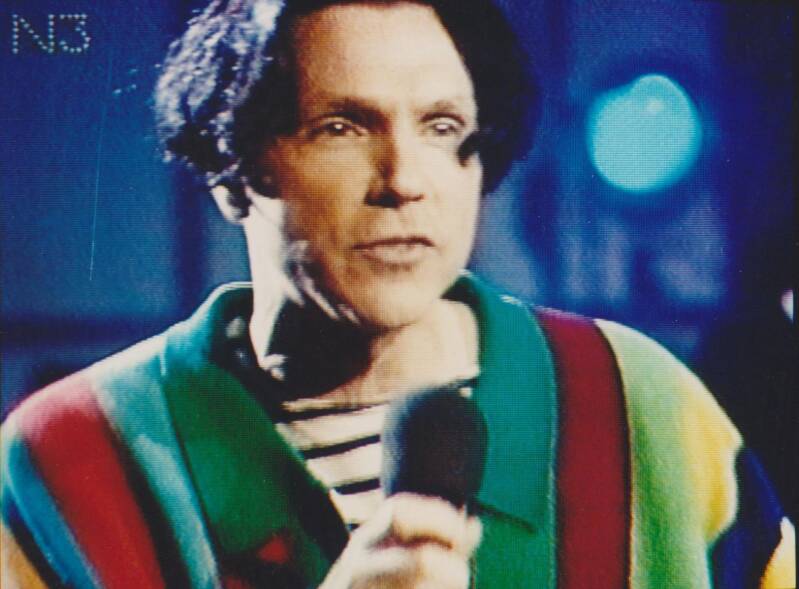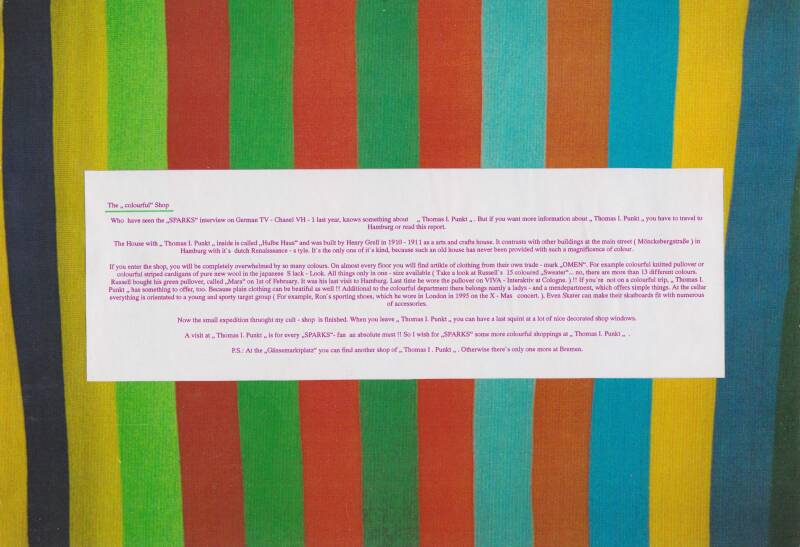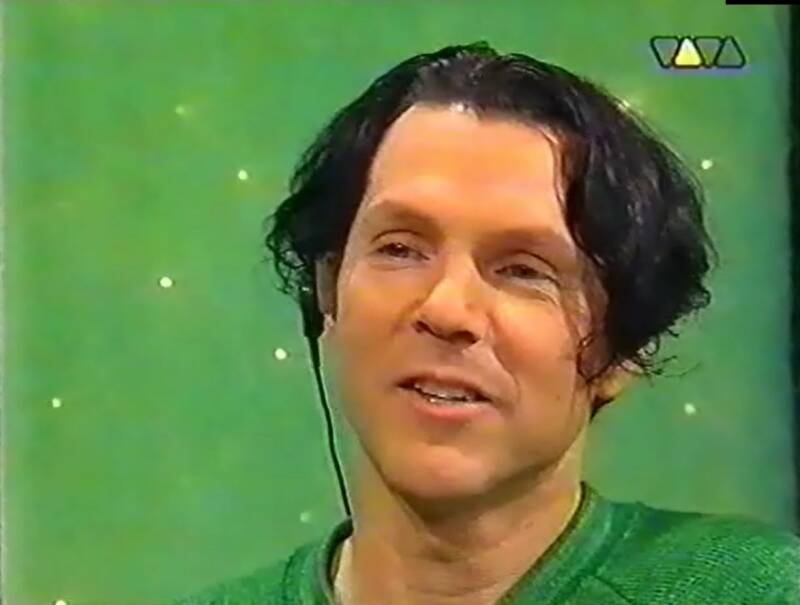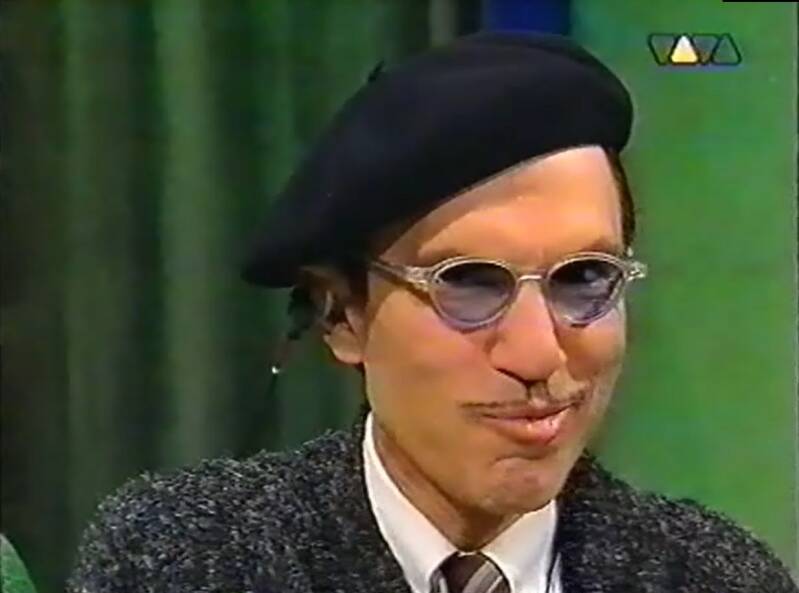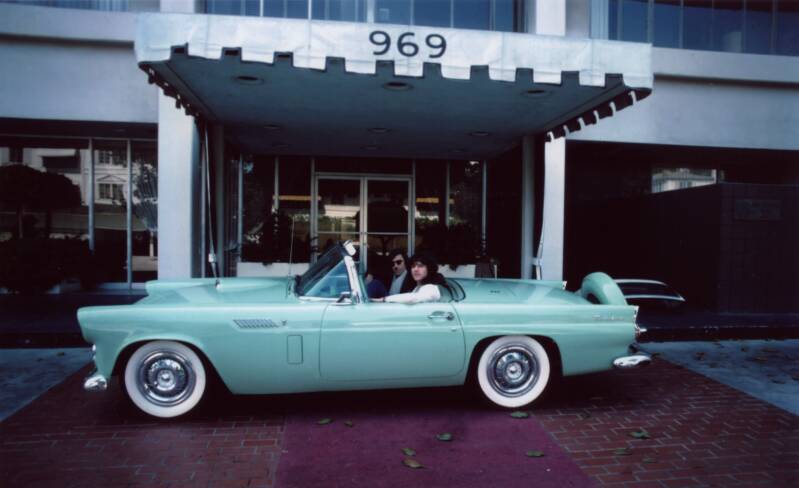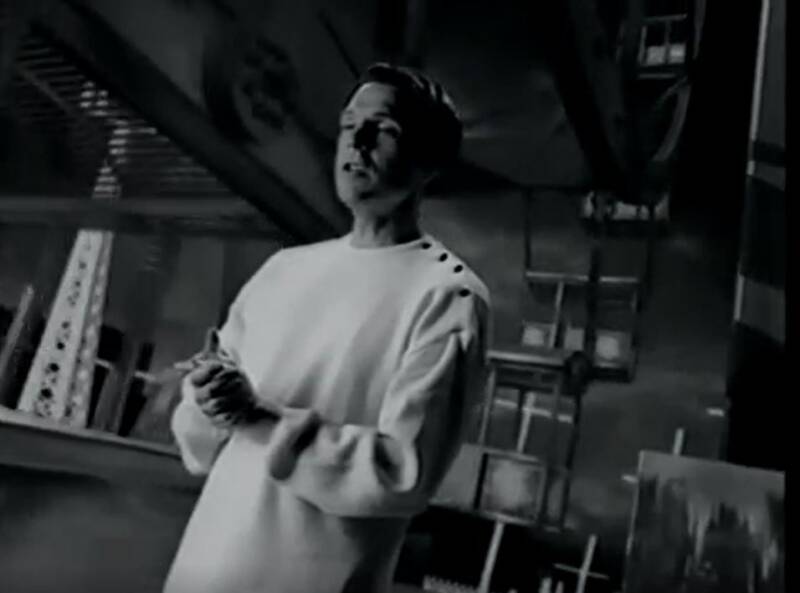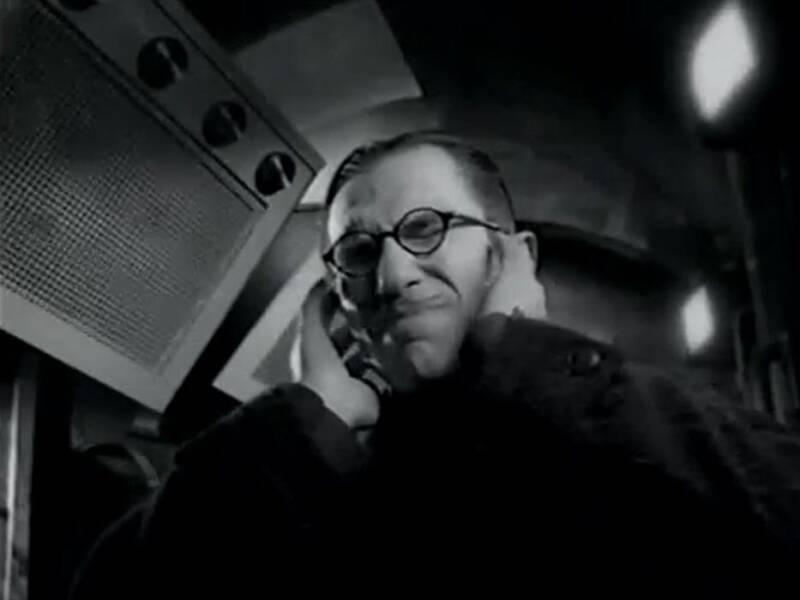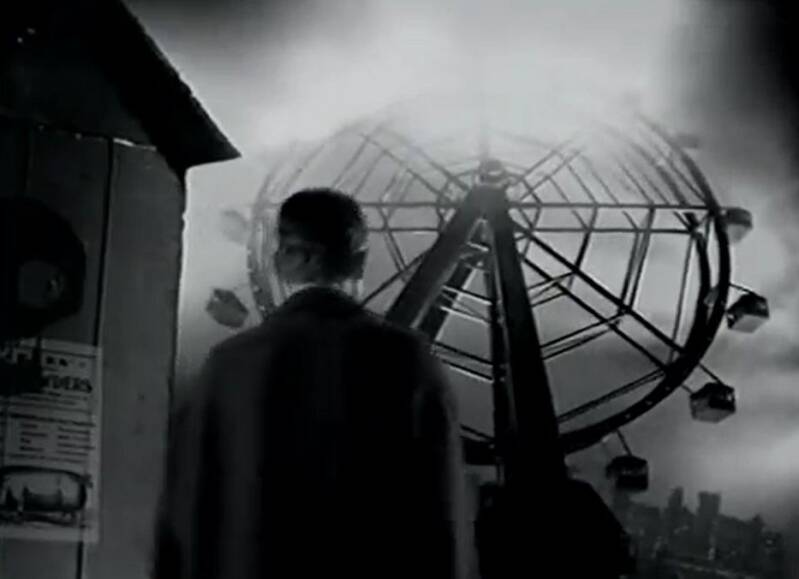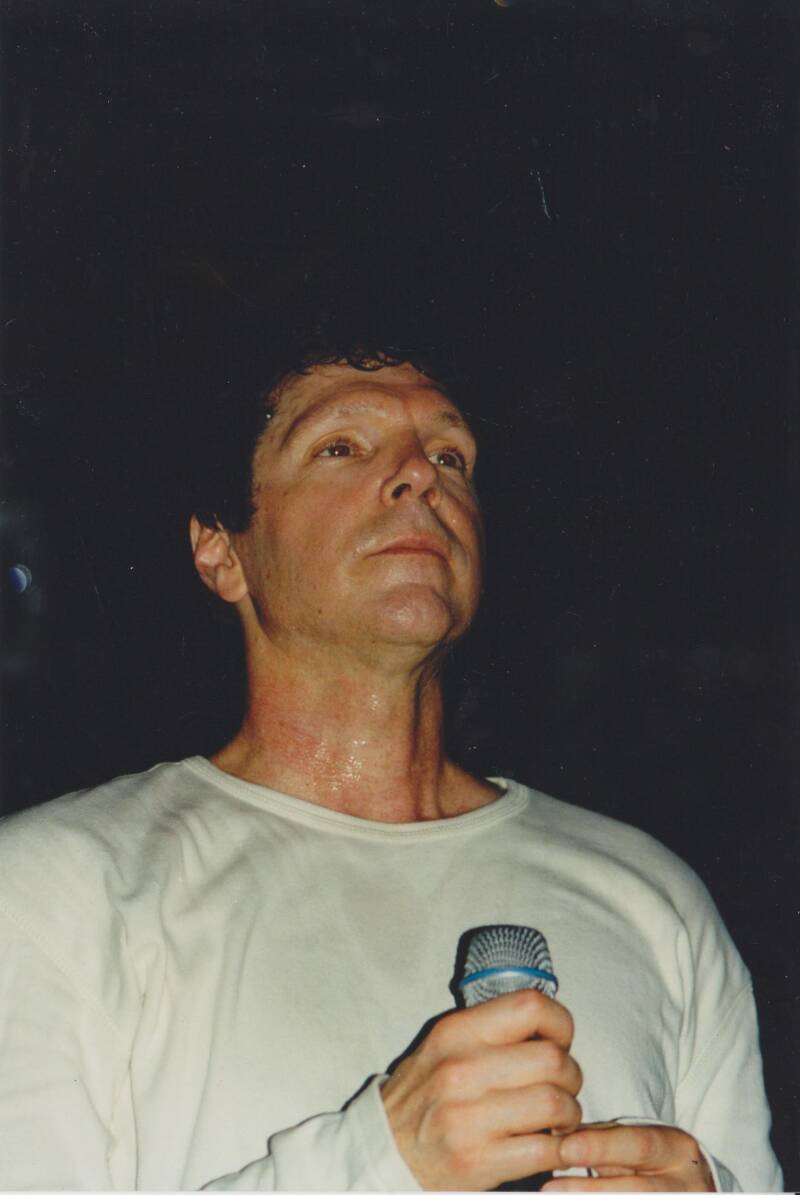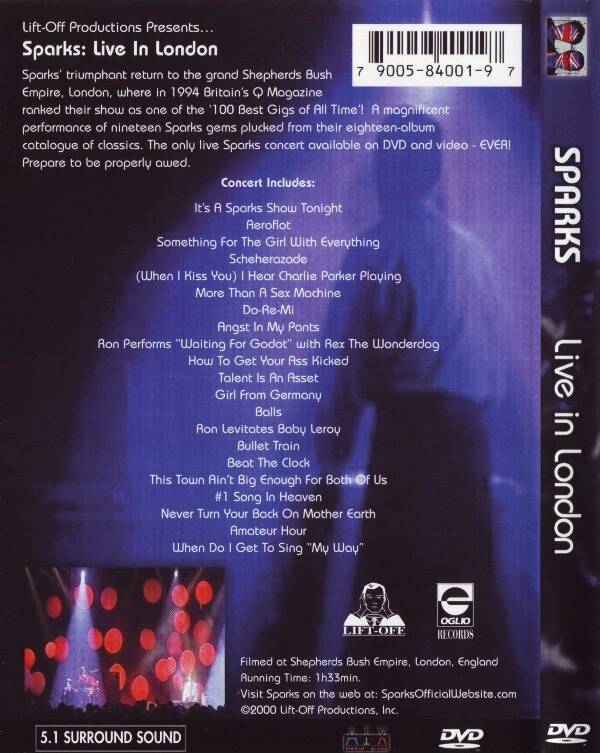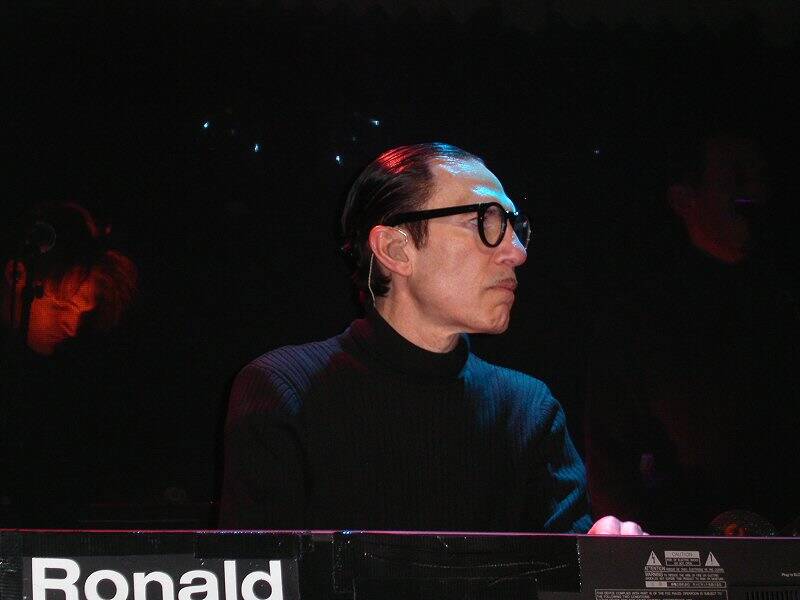Penny Brown - Sparks in Germany; doing it their way
If we associate France with Sparks' biggest European success in the 1980s, it was Germany in the 1990s that produced a whole new audience for the Maels. Their single 'When Do I Get To Sing My Way' (from the album Gratuitous Sax and Senseless Violins, 1994, released by BMG through the German company Logic) was the top airplay record in 1994, sold over 650,000 copies and topped the charts in Germany.
There were also a number of interviews made for German TV during the decade that can still be viewed on YouTube and reveal fascinating glimpses of their thinking and self-presentation during that period. Although Sparks had spent time recording in Germany at the Musicland Studios in Munich (for Whomp That Sucker (1981) and Angst In My Pants (1982)) and there had been some gigs in the country before 1990, there were relatively few live performances compared with this significant decade.
As a brief aside, a rare piece of footage of Sparks' appearance on Hits-A-Gogo on Swiss/German TV in 1972 has to be compulsory viewing for fans. With their original band line up of Earle Mankey (guitar), Jim Mankey (bass guitar) and Harley Feinstein (drums), and the audience sitting on scaffold structures around them, they perform 'Wonder Girl', the opening track on their first album, released by Bearsville in the U.S. in 1971 under the name Halfnelson, and re-released in '72 as Sparks.
This clip reveals much about the group's early self-presentation in terms of appearance and performance style: their smart suits contrast with their long flowing locks, and Ron's afro perm together with a moustache and heavy eyeliner creates a stirringly bizarre note well before 'This Town' astonished (some say traumatised) the British viewing public on Top Of The Pops in 1974. There is much prancing and posing in the manner of British bands of the time: Russell, one hand on hip, looking endearingly like a startled fawn practising moves like Jagger, while Earle Mankey sidles suggestively around him. Observant fans will also note the early appearance of Russell's pointing and waving finger, a performance mannerism still in evidence today!
The next live appearances were on 2 December 1974 in Hamburg and on 12 December in Munich with a whole new British band: Trevor White on guitar, Ian Hampton on bass and Dinky Diamond on drums. On the latter occasion there was also an after-gig phone interview with fans, organized by Bravo magazine. They performed songs from Kimono My House and Propaganda, both of which had been released in Germany that year. There were also appearances on German TV programmes that reveal how the band’s look and performance was developing: on Germany's popular Musikladen show (5 February 1975), they performed five songs; 'This Town', 'Amateur Hour', 'Something For The Girl With Everything', 'Never Turn Your Back On Mother Earth' and 'B.C.' Russell's performance is hyper-energetic: dressed in a red and white patterned winter sweater, red woollen gloves and a floor length red scarf, he cavorts around the stage, brandishing the microphone in all directions and taunting an impassive Ron, who is now sporting a short sweptback haircut. Some sources indicate that there were further dates in Hamburg, Köln and Munich in 1975, prior to a lengthy tour of the U.K and the U.S., but these unfortunately remain unconfirmed.
An early example of Sparks’ flair for a humorous and dramatic presentation can be seen in an entertaining video of 'A Big Surprise' (from Introducing Sparks (1977)) on German TV in 1977: Ron is seated at a white grand piano, with a Liberace-style candelabra, a wine glass and a reclining blonde woman, while Russell appears to be standing on rocks behind them. At the end of the song, Ron goes ‘berserk’, smashes the glass and proceeds to smash up the piano stool too, in a parody (or homage?) of Pete Townshend of The Who. A big surprise indeed!
Amongst the singles released in Germany at this time was, perhaps surprisingly, 'Girl From Germany' (1974), from A Woofer In Tweeter's Clothing released in Germany the previous year. This song recounts the singer's anticipation of the horrified reaction of his parents, still in the grips of post-war paranoia, when he tentatively introduces his new girlfriend from Germany, knowing that they will be imagining stormtroopers on the lawn but hoping that things might work out. As far as I have been unable to ascertain, this song has not however featured in the German live shows, presumably because it might be viewed as culturally insensitive.
A rare live appearance in Germany in the 1980s was a four-song set at the Circus Krone, Munich, for the Rock and Pop Festival, broadcast on the radio station Bayerischen Rundfunk on 9 December 1981. The Circus Krone was the first permanent circus building in Germany and, at this time, was a concert venue that had hosted The Who and the Beatles. The new Sparks band now consisted of members of the group Bates Motel: Bob Haag (guitar), Leslie Bohem (bass), David Kendrick (drums), and Jim Goodwin (keyboard).
An informal video of the soundcheck on this occasion provides an insight into the pre-show preparation necessary to ensure a slick and trouble-free performance: it shows Ron with a yellow guitar and the setting up of a set of gold-coloured drums. Russell, in a grey jacket and red pants, repeats parts of 'Wacky Women' and 'This Town'. The set list for the show also featured 'Upstairs' and 'Tips for Teens' (like 'Wacky Women', from 1981's Whomp That Sucker). Video footage of the gig itself has several interesting features: the band members are hyper-energetic, Russell, looking uber-handsome in a sparkling gold suit and shoes and a wing-collared shirt, his hair a curly mullet, slings his arm around Ron's neck as he sings ‘Tips For Teens’ (shades of David Bowie and Mick Ronson) and later introduces 'My big brother Ron Mael', as he still does today, as the one who does almost everything in the band.
We see how interaction between the brothers was becoming part of the image: Ron’s facial expressions as Russell claps in his face or shakes his microphone at him are hilarious, especially the wince as Russell hits a high note in ‘This Town’ and a sad shaking of the head with puzzled glances. We are also treated to the sight of Ron leaving his keyboard during ‘Tips For Teens’ to stand and conduct the band to a flourishing finish. At the end of this show, all the participants apparently joined together to play 'Give Peace A Chance' in tribute to John Lennon, who had been gunned down in New York the previous day.
Also in this decade, in 1986, Ron and Russell had done a promo tour in the U.K, France and Germany for the album Music That You Can Dance To, and performed the title song on the TV show Na Sowas with a totally different, modernistic look. They are dressed casually, Ron in a short-sleeved tee-shirt and Russell in a blue denim jacket and white pants, and they are surrounded in an exotic green and gold set by apparently naked painted women decked in metallic masks, necklaces and belts. Is the fact that the women don't move, let alone dance, at all a wry comment on the song and on disco fever itself?
The next live show was not until December 12, 1994, at the elegant Schmidts Tivoli in Hamburg to promote the very recent Gratuitous Sax and Senseless Violins, released in November on the Germany-based Logic label, after a period of self-imposed exile from the pop world while they were working on the projected movie project Mai the Psychic Girl. Ron and Russell were now touring with just Christi Haydon on percussion and backing vocals. (Much of this concert can be seen on YouTube.) It begins dramatically with raking spotlights and footlights against a plain backdrop. Their attire is strikingly contrasting: Russell swings in wearing a baggy multi-coloured sweater and check pants, while Ron sits at his trademark Ronald keyboard in formal white shirt and tie and Christi bounces sensually in her early Hollywood style black dress and long black gloves.
The generous set list of 21 numbers included seven from Gratuitous Sax and Senseless Violins ('I Thought I Told You To Wait In The Car', 'Frankly Scarlet, I Don't Give A Damn', When I Kiss You (I Hear Charlie Parker Playing)', 'Now That I Own The BBC', 'The Ghost of Liberace', 'Let's Go Surfing', ‘When Do I Get To Sing My Way?’) and the songs that had been big hits in France, 'When I'm With You' and 'Singing In The Shower'.
Apart from the fact that the Gratuitous Sax songs would have been new to many in the audience, this show was particularly noteworthy for two new departures: there were two brief interludes entitled 'Ron's piece', during which he stands centre stage while, in the first, a disembodied female voice lectures him on positive thinking and, in the second, assails him with a chat-up line; the concert also introduced Christi doing a surprise turn as main vocalist, singing the delightful 'What Would Katherine Hepburn Say?', while Russell strenuously plays percussion.
They returned the following year, 1995, for a series of gigs throughout May in Hamburg, Berlin, Mannheim, Stuttgart, Munich, Frankfurt, Köln and Linz, and further concerts in Munich (6 July) and Hanover (22 July) interspersed with visits to the U.K. and Holland. Some of the July Munich concert at the Alabama Halle has been preserved in a six-part video: Ron, in a white shirt and pink and black striped tie, Russell in an oversize yellow jacket (jettisoned after a few numbers), baggy black sweater and loose black and white striped pants and Christi in her now trademark black dress and gloves and swinging bob perform in front of a crowded stage set of classical pillars, ivy-clad broken columns and an ornate fountain with running water, inspired by a scene in the video of 'When Do I Get To Sing My Way'.
This elaborate background, which appears in Sparks' other televised appearances at this time, is, of course, before bands routinely used projections of complex graphics and films to accompany their music, such as Sparks were to deploy some years later for the Lil' Beethoven show. The set lists seemed to have varied somewhat during this year's tour, but the Munich programme consisted of numbers from Gratuitous Sax and Senseless Violins interspersed with some favourites including 'Number One Song in Heaven', 'Angst In My Pants', 'Never Turn Your Back On Mother Earth', and 'This Town'. The audience appear to stand quietly for most of the set, but become more animated for 'When Do I Get To Sing My Way' and cheer when the unmistakeable introduction to 'This Town' begins.
The filming of this gig is professional and original, with repeated close-ups of each of the three performers, including some great shots of Ron's hands on the keyboard, shown from above and beneath. It is a hugely energetic performance: Russell bounces and twirls between verses (contrast his 1970s moves), while Christi plays the drums and tubular bells with gusto and Ron tap dances before the band launches into 'When I Kiss You...’, a new dancing skill he was keen to show off in another context (see below).
The mid-1990s also saw a flurry of reviews, press articles and numerous interviews and appearances on German television shows like Damals und Heute, Hallo Halberg, Musikladen, Fernsehn Garten ZDF and Loloroso WDR, capitalising on their new-found success there. This discussion can only attempt to consider a few of the most noteworthy or unusual examples, but there are many interesting insights into this period of Sparks’ career. In December 1994, the TV show Rock Archiv dedicated a full hour to Sparks, with interviews, vintage footage, and live performances of several songs from Gratuitous Sax. At an appearance on Stars 95, they are presented with a gold disk for 'When Do I Get To Sing My Way', which Russell announces will be donated for auction to the cause to fight Aids. The upcoming major tour of Germany ('our first ever') in May 1995 (discussed above) is also announced here. The dates and venues appear on the highly imaginative brief video commercial for the Gratuitous Sax album, in which the cover images 'come alive' and Russell casts eye-flutteringly quizzical looks at the changing images of his brother's accusing pointed finger. On March 31, Logic Records had celebrated the success of 'When Do I Get To Sing My Way' with a 'Gold Party' at Frankfurt’s Europaturm, a giant telecommunications tower with revolving bars. Sparks were now definitely big stars in Germany.
Some of the interviews are characteristically both informative and humorous (and occasionally surreal). Apart from the usual comments about their past career, Ron and Russell talk about issues central to their thinking at this time, particularly the discovery of a new young audience. Warning: as often in Sparks' interviews, a liberal sprinkling of salt has to be taken with some of their answers! In fact, a sense of fun and irreverence pervades all the interviews: the following description of a full-length Sparks special for
am Viva Germany, broadcast in early 1995, for example, fully conveys the flavour of many such occasions. In several scenes, Ron unaccountably tap-dances on a bar counter while Russell addresses the camera. Conversely, while Ron comments in deadpan manner, the occasional twitch of Russell's lips suggests that perhaps the remarks should not be taken at face value. This same programme, which contains clips from videos and live shows, actually begins by featuring the wrong birth dates and names for the boys, perpetuating the myth that they were the sons of Doris Day.
This false trail, laid at an early stage in their career, was intended as a publicity hook to intrigue the public, but had clearly still not been put to rest at this stage. However, Ron and Russell have serious things to say on subjects ranging from their inspirations and influences, their writing process, their uncompromising determination to avoid pop clichés and their shared vision and goals for Sparks, to their personal image, the role of music videos in enhancing the mood of a song, and the advantages of having their own home studio. Russell, introducing here his own technical role in their work, describes the studio as a 'playground' in which they can explore the potential of working with innovative electronics like drum machines.
Their discussion of other bands they have admired (or who admire them), particularly British bands, includes clips of performances from the Rolling Stones, The Who and The Kinks, and more recent bands like Pet Shop Boys, Erasure, Depeche Mode, Soft Cell, Human League and, of course, Morrissey. They also describe how their love of film has informed their work, in that they regard each of their songs as a miniature scenario telling a story, and they cite the number of films and artists name-checked on Gratuitous Sax.
While emphasising their delight at the inspiring response of young audiences to their work, they stress that they make no compromises for a mixed audience. They also joke about other consequences: Russell tells of being mobbed by young screaming females at gigs, including one Berlin girl who, a couple of inches from his nose, kept repeating the proposition 'Du kommst mit mir? ('Come with me?'). Ron follows up by commenting on the different types of fan letters they get: serious ones on artistic matters from intelligent girls for him, and marriage (and other less formal) proposals for Russell.
On their unusual image, a perennial topic in interviews, Russell clarifies that in reality they also like normal things like shopping in the supermarket for cookies, and that the perceived eccentricity is not an artifice, but 'just the way we are'. He is keen to stress that they have no need of drugs because they get their high from performing, but admit to loving food and fashion.
This programme certainly attests to the latter, as each section presents a different sartorial image: Russell's silvery grey silk waistcoat is particularly striking and his long-lasting love affair with stripes is amply apparent here. Lastly, they depict their pet likes and dislikes about Germany: German girls and coffee (likes), and traffic on the autobahns and smoking (dislikes): 'Das ist nicht gut', Russell earnestly informs us. Above all, they express their affection for Germany, their 'new home', and Ron makes the point that their current manager, Eric Harle, is of German origin. Unfortunately for non-German speakers, the discussion in this fascinating, wide-ranging and lively programme is overlaid with a simultaneous translation into German so that much of the dialogue is obscured, but viewing is still immensely worthwhile.
Many of the issues raised here are repeated and developed in other interviews of the period.
In another 1995 interview for VH-1, the sensitive question of similarities to other contemporary bands (notably The Pet Shop Boys) is raised again, and Russell's diplomatic answers are couched so that nevertheless, the 'public can see the chronology of events' as he puts it. When the same issue arose in a 1994 VH-1 interview in respect of Roxy Music, Russell had reminded the interviewer that Sparks had already released two albums before Brian Ferry's band hit the scene and in 2000, in a Sparks Special Kuno's programme, he asserts that Sparks were creating effects like stacking up vocals before Queen's monster hit 'Bohemian Rhapsody' appeared. The comparative lack of massive commercial success and formal recognition for their constant innovation and their status as forerunners of so many musical trends must have been a constant irritation to them, as indeed it is incomprehensible to fans.
On the same Kuno’s show, they comment on their musical career album by album leading up to a discussion of Balls, and present the different colour covers, inviting the viewer to collect them all. The orange one, designed for promotion only, is apparently the most rare (and hence most desirable), any lucky owners please note. At the end of this programme, they are asked how long they think they will go on. The answer; ‘well, hopefully, a long time....’!
In the 1995 VH1 interview, the subject of fashion comes to the fore: Russell sports a rainbow sweater of thirteen different colours, bought from an upmarket Hamburg shop, the uniqueness of which is commented upon at length, until Ron's deadpan contribution that he wears a shirt from C & A. The contrast in stage clothing and general appearance between the flamboyant (and sometimes bizarre) and the soberly classical has, of course, long been an iconic feature of Sparks self-presentation, and is nicely encapsulated in this exchange. Ron is also at his most modest: when after a clip of 'When I Kiss You (I Hear Charlie Parker Playing'), he is asked if he is a fan of Charlie Parker, he tells us that he likes music that he himself can't do (notably jazz and classical).
However, the huge variety of styles, motifs and arrangements of his later compositions testify, on the contrary, to his musical versatility and brilliance. It is noticeable in several of these interviews that Russell talks a lot more in answer to questions while Ron is comparatively silent. Occasionally he even looks a little put out (although this quite possibly an act), and in this interview, he writes ‘Next Question’ on a piece of paper and holds up ‘Overlong Answer’ while Russell holds forth.
In a 1996 interview with Tobi Schlegl for Viva, Russell highlights how the discovery of an enthusiastic young audience had led to the idea of presenting their earlier songs in a new way to introduce them to their past catalogue. Thus, Plagiarism (1997) was born. Again, for non-German speakers, this interview is slightly disorientating because of the simultaneous translation. One moment needs no translation however: a picture from a book called Pop Stars in Underpants is displayed, and Russell obligingly gets up to show off his blue and white checked underpants to the camera.
Other jokes abound: after a clip of 'Now that I own the BBC', they describe their fantasy of a station that plays nothing but Sparks’ music. They also take phone-in questions, where they touch once more on the topic of influences on their work: Ron, channelling a French café musician in a black beret and blue-tinted glasses, mentions their early love of the The Kinks and The Who, while Russell chips in with the enlightening offering that Ron writes their songs, while he only poses in his underpants! He repeatedly characterises their professional relationship in similarly humorous and self-deprecating terms, more recently in the interview for Radio London in August 2017, were he claims that Ron writes the songs while he watches. Ron remarks that 'it's called collaboration'! One that, of course, certainly does work!
The concept behind the new album Plagiarism is developed in an interview on VH1 in 1997. The same excellent bilingual interviewer as in 1995 both chats with Ron and Russell and communicates their responses directly to the German viewers. Using 'This Town' as an example, they explain their feeling that their songs are not easily dated since they were always felt to be ahead, or on the side of, the times. Their hope was that Plagiarism, which presents many of their best-loved numbers in new and sometimes surprising guises with innovative orchestration and collaborations, would be seen as contemporary, while at the same time initiating new listeners into their past work.
This album, which features the sensational version of 'This Town' with a heart-stopping sweeping orchestral accompaniment and the memorable collaboration of Russell with Jimmy Somerville on 'The No. 1 Song in Heaven’, was certainly a bold and exciting venture to delight fans both old and new. This same interview reveals Ron's love of Nike Air Jordan shoes because of his admiration for Michael Jordan of the basketball team the Chicago Bulls, and, even more exciting, perhaps, for voyeuristic fans are the shots of Russell’s collection of models of Elvis, superheroes, monsters and other figurines and the discussion of their liking for souvenirs acquired on their many overseas visits. Unforeseen humour is caused when the interviewer is momentarily confused by the discussion of Ron's collection of snow domes, which he mishears as 'snowballs'.
As he queries the problem of the climate in their home town, Russell hastens to clarify that a more typical dome for Los Angeles would contain black, swirling fog. In further L.A. shots, the pair show off their cars: Ron's boxy black German car and Russell's beloved 1956 Ford Thunderbird (in 'willow green', he explains proudly).
Also in 1997, Ron and Russell presented a programme on Hogh 5 VH1 of their choice of five favourite music videos, with a brief commentary. Their selection is interesting, compared with their choice of tracks for the more recent BBC Music Radio 6 programmes (Jarvis Cocker's Sunday Service) in 2015 and 2017. For German TV, they chose 'Wuthering Heights' by Kate Bush, because they too like to include literary and cinematic references in their work, Public Enemy's 'Fight the Power', Faith No More's 'Easy', Kraftwerks 'Trans Euro Express' and one of their own, the video for 'Number One Song In Heaven'.
This video, with its stunning ferris wheel sequence, they say, is specially for people in Vienna, who will immediately grasp its significance: the giant wheel in Riesenradplatz was featured in the iconic movie The Third Man, and was placed on the list of Treasures of European Film Culture by the European Film Academy in 2016. By way of sign-off, Ron, in typically laconic fashion, tells viewers that if they didn't like their choices, they can 'piss off'. (Could viewers have imagined then that he would one day write a song called that?)
The next flurry of activity in Germany came at the end of 2000, with a substantial tour in December to promote the new album Balls, taking in Bielefeld, Berlin, Hamburg, Köln, Heidelberg, Mainz, Marburg, and Munich and finishing with a spot at the stunning New Year's Eve concert at the Brandenburg Gate in Berlin. If the German shows followed the same pattern as the September London gig at which the live video, Sparks in London, was filmed, the set lists were a mixture of numbers from Balls ('Aeroflot', 'Scheherazade', 'More Than A Sex Machine', 'How To Get Your Ass Kicked', 'Bullet Train', 'The Calm Before The Storm', 'The Angels') and favourites including 'When Do I Get To Sing My Way', especially to please German fans. Ron and Russell shared the stage with their new drummer Tammy, who debuted as a member of Sparks in 1997, surrounded by helium balloons that change colour with the lights. Russell now has a shorter hairstyle and is wearing a baggy top and matching pants in horizontal stripes (no, it is not a prison outfit!) Later he changes to an equally baggy white sweater, while Ron coordinates with a striped tie. For this show, Ron also performs two brief 'dramatic pieces', to roars of approval: 'Waiting for Godot, with Rex the Wonder Dog' and 'Ron levitates Baby Leroy' in which a plastic doll, introduced as his illegitimate son, rises from his hands on a clearly perceptible string. Maybe not as dynamic as some of the interactive performances that were to come later with Lil' Beethoven, but, like his eagerly awaited solo 'dance', they are evidence of Ron's enthusiasm for performing centre stage, as well as behind a keyboard.
Footage of the New Year's Eve Silvester Party show Ron, Russell and Tammy performing on a huge open-air stage before banks of lights to an enormous audience (500,000 were estimated to be at the event, with a further 6 million watching the broadcast on television). Dressed for the cold, Russell wears a thick white polo neck sweater and striped pants and Ron a beige suit, but Tammy is the sartorial star of the show in red leather trousers, a fake leopard skin coat and high-heeled boots. To close the show, they play 'The Calm Before The Storm', and their new single, 'The Angels' (minus the profanity), for which the three of them stand front of stage and wave sparklers to wish the crowd a Happy New Year. It must have been quite an occasion.
While guests on the NBC Giga TV show in 2000, to promote Balls, Russell demonstrated their new website, which included a brief history of Sparks in 18 albums, an 'Ideosyncracies' section featuring a moustache game, and a glimpse of the animated video for 'The Calm Before The Storm', thought by many to be the best song on the album. This video, made in Paris by animators Olivier Kuntzel and Florence Deygas, won the German Internet 'Best Video of the Summer' accolade. Clearly Sparks were keen early on to exploit the potential value of this technology in promoting their new ventures and communicating with their growing, world-wide fan base.
Despite the German-linked conceit of the career of Lil' Beethoven, a fictional Sparks' invention that was to become the name of their own label, there appears to have been no live presentation of the album that bears his name in Germany in the first decade of the new century. However, the Hello Young Lovers show did reach Hamburg in February 2006 and, as everywhere, was very warmly received. On this tour, the new band consisted of Dean Menta (guitar), Josh Klinghofffer (guitar, alternating with Jim Wilson), Steve McDonald (bass) and Tammy Glover (alternating with Steve Nistor) on drums. The set list comprised the songs from Hello Young Lovers in the first half, and a Sparks Show of earlier material in the second half.
As the DVD of the live show (called, unsurprisingly, Dee Vee Dee), filmed at the Forum, London, reveals, Sparks’ investment in stunning projected video images, including cat-headed figures ('Here Kitty'), guitars and umbrellas raining down for 'Waterproof' and a thousand marching Rons and Russells in uniform for 'Baby, Baby, Can I Invade Your Country', adds an hilarious and uniquely Sparks-like element to the performance. Ron displays his talent for drama, already seen in 2004 for Lil' Beethoven, by interacting dynamically with the videos, fighting with a projected image of himself for 'The Very Next Fight', and playing a gigantic cartoon organ for 'When I Sit Down To Play The Organ (In The Notre Dame Cathedral)'. Russell is more formally dressed than usual in a natty red and black striped jacket over a white sweater, but in the second half, the jacket is jettisoned and his sleeves rolled up as he gets down to the business of delighting the audience with old favourites.
The live shows for Exotic creatures of the Deep (2008), also gave Germany and many other European destinations a miss, perhaps because of festival commitments in Tallin, Japan and Scotland in the summer following the epic and doubtless exhausting 21 x 21 Spectacular in London in May-June, and the start of work in 2009 on The Seduction of Ingmar Bergman, commissioned by Swedish radio.
However, the Sparks website announced on 1 October 2008 a 'German Renaissance', listing a huge number of press accolades and media plays of Exotic Creatures, which was released in Germany on 4 October 2008, and became record of the month on WDR2, the biggest radio station in West Germany. The same announcement also alerts fans to interviews in German publications and on radio stations WDR2 and 3, so the German fans were certainly not being ignored.
The extensive 2012 tour that took Two Hands, One Mouth across Europe saw gigs in mid-October in Berlin, Hamburg, Frankfurt and Bochum. As elsewhere, the stunning experience of being able to appreciate Ron’s piano interpretation of his music and focus closely on Russell's interpretation of the lyrics, was ecstatically received by the German audiences, many members of which would not have seen Sparks perform live for some time.
The set list for this tour featured a range of material from their back catalogue, including 'Suburban Homeboy', 'Something For The Girl With Everything' and excerpts from The Seduction of Ingmar Bergman (with Ron playing Bergman) and concluding with the specially composed 'Two Hands One Mouth' song. The Overture, a seamless mixture of well-known hooks played by Ron alone at the keyboard, delighted audiences everywhere on this tour, as did Russell's stylish plus four style pants and striped socks and Ron's famous dance to 'Beat the Clock'.
Recently, Berlin seems to be the most favoured venue in Germany. As well as FFS's hugely successful show at the Gloria Theatre in Cologne, a former 1950’s cinema, on 1 July 2015, they played at the Lollapalooza Festival held in the park of the old Berlin-Tempelhof airport, now a venue for fairs, festivals and other events, on 12 September. Sparks’ collaboration with the members of Franz Ferdinand (Alex Kapranos, Nick McCarthy, Bob Hardy and Paul Thomson) in the super-group FFS, produced a superb album and an extensive and hugely successful tour.
Two years on, on the same date, 12 September, Hippopotamus arrived at the Columbia Theatre, the Modernist concert hall in Berlin, for what, according to reports on social media, was another joyous occasion. Sparks' new and dynamic band consisted of Evan Weiss and Taylor Locke (guitars), Zach Dawes (bass), Tyler Parkford (keyboard) and experienced Sparks' drummer Steve Nistor.
The band was kitted out in Breton-look navy blue and white striped tee-shirts, while Russell wore a striped sweater (replicated by a number of the audience), and a rather eccentric combination of cut-off pedal-pusher pants and formal black shoes with red laces and no socks. On this occasion, Ron shone in a striped jacket and matching tie, which combined his usual sartorial style with the overall look of the band. They performed six numbers from Hippopotamus ('What The Hell Is It This Time', 'Edith Piaf Said It Better Than Me', 'I Wish You Were Fun', 'Missionary Position, 'Scandinavian Design', and, of course, 'Hippopotamus') and nine other songs, including the perennial crowd-pleaser 'When Do I Get To Sing My Way'.
The band made a surprise return to Berlin on 6 October at the Schwuz club for a gig in the Arte Concert series, which was streamed live. A slightly overawed Russell began the event with the words, 'Good Evening Berlin, Good Evening the World!' before the full set as elsewhere was performed.
Sparks and the Hippo returned in June 2018 for gigs in Munich, Cologne and Hamburg with a new line-up and a new look. The equally strong and enthusiastic backing band were Evan Weiss and Eli Pearl (guitars), Patrick Kelly (bass), Steve Nistor (drums) and Alex Casnoff (additional keyboards). The fashion theme this time was pink, with the band in pink denim jackets, Russell in an elegant pink military-style jacket and Ron in a pink tie which was thrown into the audience at the start of his dance. (Perhaps you have one??)
The 18-song set list differed slightly this time, with six songs from Hippopotamus and older songs including ‘Tryouts For The Human Race’ and ‘B.C.’ Before the (almost obligatory) rendering of ‘When Do I Get To Sing My Way’, Russell sang a verse of the classic ‘My Way’ (‘and now the end is near..’), an unusual departure that may have sparked fears for a brief moment, of an imminent retirement announcement. No Way!
Of course, the planned 2020 tour for the next album A Steady Drip, Drip, Drip had to be postponed because of the worldwide coronavirus pandemic, as were the revised dates for 2021. However, it is hoped that these will happen in Spring 2022, when there are to be concerts at the Berlin Metropol, and the Mojo Club in Hamburg in June.
The reception of the Hippopotamus shows in Germany demonstrated once again the faithful following that Ron and Russell enjoy there, and the continuing appeal of their blend of pop and high culture to audiences of various ages. Reader: perhaps you were there? It is no wonder that Germany can be added to the list of places they feel to be a home from home.
Penny Brown
April 2021
